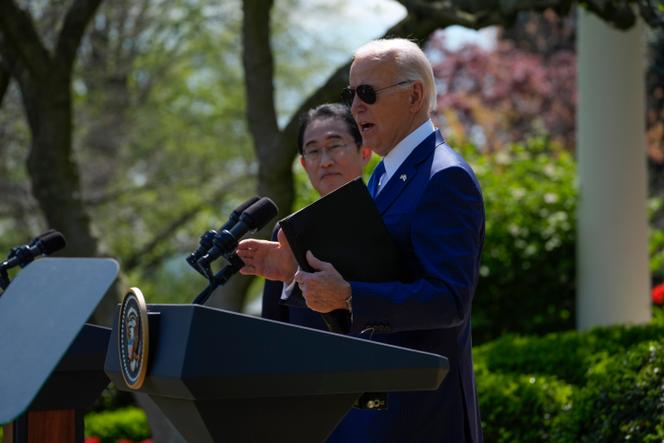


US President Joe Biden and Japanese Prime Minister Fumio Kishida unveiled their countries' biggest-ever upgrade in defense ties Wednesday during a White House state visit focused on countering a resurgent China. Underscoring Japan's importance as a key ally against Beijing in the Asia-Pacific region, Biden declared "This is the most significant upgrade in our alliance since it was first established."
The two leaders unveiled plans to restructure the US military command in Japan, the biggest such change since the 1960s. The move is aimed at making US and Japanese forces more nimble in the event of threats, such as a Chinese invasion of Taiwan.
The United States, Japan, and Australia would also launch a joint air defense network, while Britain would take part in military exercises with Washington and Tokyo. US officials said the broader boost in ties was also aimed at reassuring allies of long-term support even if Donald Trump beats Biden in November's US presidential election.
The moves come amid tensions about Beijing's claims over both Taiwan and huge swathes of the South China Sea, despite efforts by Washington to reduce the risk of conflict. Biden insisted that the military upgrade in China's backyard was purely defensive and "not aimed at any one nation or a threat to the region." Kishida meanwhile called during the press conference for "peace and stability" across the Taiwan Straits. "Unilateral attempts to change the status quo by force or coercion is absolutely unacceptable, wherever it may be," the Japanese Premier said. Biden has made no bones about his desire to create alliances across the region to counter China. On Thursday, he will host the first trilateral summit between Japan, the Philippines, and the United States, aiming to deepen their alliances.
The pomp-filled state visit for Kishida was however also meant to underscore the broader cultural and economic relations between two allied nations who were at war 80 years ago. Biden announced that a Japanese person will be the first non-American to walk on the Moon, flying on a US mission due to take place in a few years' time. The leaders also announced deals for technology, including artificial intelligence and the economy.
Kishida is the first Japanese leader to get a US state visit since Shinzo Abe in 2015, and only the fifth world leader to receive one since Biden took office in 2021. Four of those have been Asian leaders, reflecting Biden's strategic priorities even as he wrestles with wars in Ukraine and Gaza. Staunchly pacifist for decades, Japan has in recent years made "some of the most significant, momentous changes" since World War II, US ambassador to Japan Rahm Emanuel said ahead of the visit.
